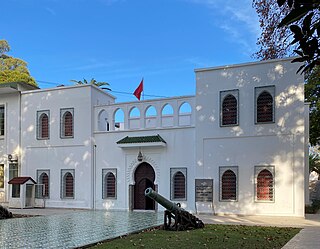This article needs additional citations for verification .(December 2013) |
 |
|---|
| Judiciary |

The Judiciary of Morocco is an independent branch of the Moroccan government, subject only to the Moroccan Constitution.
This article needs additional citations for verification .(December 2013) |
 |
|---|
| Judiciary |

The Judiciary of Morocco is an independent branch of the Moroccan government, subject only to the Moroccan Constitution.
The Moroccan court structure consists of:
In June 2006, Morocco and Argentina signed a bilateral agreement on judicial cooperation.

The International Criminal Tribunal for the former Yugoslavia (ICTY) was a body of the United Nations that was established to prosecute the war crimes that had been committed during the Yugoslav Wars and to try their perpetrators. The tribunal was an ad hoc court located in The Hague, Netherlands.

The Permanent Court of Arbitration (PCA) is a non-UN intergovernmental organization located in The Hague, Netherlands. Unlike a judicial court in the traditional sense, the PCA provides services of arbitral tribunal to resolve disputes that arise out of international agreements between member states, international organizations or private parties. The cases span a range of legal issues involving territorial and maritime boundaries, sovereignty, human rights, international investment, and international and regional trade. The PCA is constituted through two separate multilateral conventions with a combined membership of 122 states. It is not a United Nations agency, but a United Nations observer.

A tribunal, generally, is any person or institution with authority to judge, adjudicate on, or determine claims or disputes—whether or not it is called a tribunal in its title. For example, an advocate who appears before a court with a single judge could describe that judge as "their tribunal." Many governmental bodies that are titled as "tribunals" are described so in order to emphasize that they are not courts of normal jurisdiction. For example, the International Criminal Tribunal for Rwanda was a body specially constituted under international law; in Great Britain, employment tribunals are bodies set up to hear specific employment disputes. In many cases, the word tribunal implies a judicial body with a lesser degree of formality than a court, in which the normal rules of evidence and procedure may not apply, and whose presiding officers are frequently neither judges, nor magistrates. Private judicial bodies are also often styled "tribunals." The word tribunal, however, is not conclusive of a body's function—for example, in Great Britain, the Employment Appeal Tribunal is a superior court of record.
The court system of Canada forms the country's judiciary, formally known as "The King on the Bench", which interprets the law and is made up of many courts differing in levels of legal superiority and separated by jurisdiction. Some of the courts are federal in nature, while others are provincial or territorial.
Federal tribunals in the United States are those tribunals established by the federal government of the United States for the purpose of resolving disputes involving or arising under federal laws, including questions about the constitutionality of such laws. Such tribunals include both Article III tribunals as well as adjudicative entities which are classified as Article I or Article IV tribunals. Some of the latter entities are also formally denominated as courts, but they do not enjoy certain protections afforded to Article III courts. These tribunals are described in reference to the article of the United States Constitution from which the tribunal's authority stems. The use of the term "tribunal" in this context as a blanket term to encompass both courts and other adjudicative entities comes from section 8 of Article I of the Constitution, which expressly grants Congress the power to constitute tribunals inferior to the Supreme Court of the United States.

The Court of First Instance is the lower court of the High Court of Hong Kong, the upper court being the Court of Appeal. Formerly the High Court of Justice of the Supreme Court of Hong Kong, it was renamed the Court of First Instance by the Basic Law after the transfer of sovereignty over Hong Kong from the United Kingdom to China.

The judiciary of Romania is organized as a hierarchical system of courts, with a civil law system. Provisions regarding its structure and organization are found in the Constitution and Law no. 304/2004 on judicial organization.
Lahcen Ikassrien is a citizen of Morocco who was held in extrajudicial detention in the United States Guantanamo Bay detainment camps, in Cuba. Ikassrien's Guantanamo ISN was 72. The Department of Defense reports that Ikassrien was born on October 2, 1972, in Targist, Morocco.

Ali Lmrabet is a Moroccan journalist and a member of the Moroccan Association for Human Rights.
Mohammed Souleimani Laalami was a citizen of Morocco, who was held in extrajudicial detention in the United States Guantanamo Bay detainment camps, in Cuba. Laalami's Guantanamo detainee ID number is 237. The Department of Defense reports he was born on March 4, 1965, in Casablanca, Morocco.

The judiciaries of the United Kingdom are the separate judiciaries of the three legal systems in England and Wales, Northern Ireland and Scotland. The judges of the Supreme Court of the United Kingdom, the Special Immigration Appeals Commission, Employment Tribunals, Employment Appeal Tribunal and the UK tribunals system do have a United Kingdom–wide jurisdiction but judgments only apply directly to the jurisdiction from which a case originates as the same case points and principles do not inevitably apply in the other jurisdictions. In employment law, employment tribunals and the Employment Appeal Tribunal have jurisdiction in the whole of Great Britain.

Arbitration is a form of alternative dispute resolution (ADR) that resolves disputes outside the judiciary courts. The dispute will be decided by one or more persons, which renders the 'arbitration award'. An arbitration decision or award is legally binding on both sides and enforceable in the courts, unless all parties stipulate that the arbitration process and decision are non-binding.

The Superior Court of Justice is the highest appellate court in Brazil for non-constitutional questions of federal law. The STJ also has original jurisdiction over some cases. Its competence is described in Article 105 of the Brazilian Constitution of 1988.
The Business Court in Belgium is a court which deals with commercial litigation that exceeds the competence of the Justice of the Peace and hears appeals against the decisions of the Justice of the Peace in commercial cases. It is not a division of the Court of First Instance because commercial law is not a branch of civil law in Belgium. There is a Commercial Court in each judicial arrondissement of Belgium.
The Lands Tribunal is a tribunal in Hong Kong that deals with legal disputes over land. It was established by the Lands Tribunal Ordinance. It is situated in the former Kowloon Magistracy building.
In the 1990s in Morocco gradual political reforms culminated in the constitutional reform of 1996, which created a new bicameral legislature with expanded, although still limited, powers. Although reportedly marred by irregularities, elections for the Chamber of Representatives were held in 1997. With the death of King Hassan II of Morocco in 1999, the more liberal-minded Crown Prince Sidi Mohammed, who assumed the title of Mohammed VI, took the throne. He has since enacted successive reforms to modernize Morocco, and the country has seen a marked improvement in its human rights record. One of the new king's first acts was to free some 8,000 political prisoners and reduce the sentences of another 30,000. He also established a commission to compensate families of missing political activists and others subjected to arbitrary detention.

Abdul Latif Nasir is a Moroccan man formerly held in administrative detention in the United States Guantanamo Bay detention camps, in Cuba. His Guantanamo Internment Serial Number was 244. Joint Task Force Guantanamo counter-terrorism analysts report he was born on March 4, 1965, in Casablanca, Morocco. Abdul Latif Nasir and Sufyian Barhoumi tried to file emergency requests to be transferred from Guantanamo in the final days of Barack Obama's presidency.

The Tangier International Zone was a 382 km2 (147 sq mi) international zone centered on the city of Tangier, Morocco, which existed from 1925 until its reintegration into independent Morocco in 1956, with interruption during the Spanish occupation of Tangier (1940–1945), and special economic status extended until early 1960. Surrounded on the land side by the Spanish protectorate in Morocco, it was governed under a unique and complex system that involved various European nations, the United States, and the Sultan of Morocco, himself under a French protectorate.

The Mendoubia or Mandubiyya refers to the former ceremonial mansion of the Mendoub, the representative of the Sultan of Morocco in the Tangier International Zone from 1924 to 1956. It now houses the commercial court of Tangier and a memorial museum.